Serving 376 students in grades 9-12, Hillsboro-deering High School ranks in the bottom 50% of all schools in New Hampshire for overall test scores (math proficiency is bottom 50%, and reading proficiency is bottom 50%).
The percentage of students achieving proficiency in math is 30-39% (which is lower than the New Hampshire state average of 40%). The percentage of students achieving proficiency in reading/language arts is 50-59% (which is approximately equal to the New Hampshire state average of 51%).
The student:teacher ratio of 11:1 is equal to the New Hampshire state level of 11:1.
Minority enrollment is 9% of the student body (majority Hispanic), which is lower than the New Hampshire state average of 18% (majority Hispanic).
Quick Stats (2025)
- Grades: 9-12
- Enrollment: 376 students
- Student:Teacher Ratio: 11:1
- Minority Enrollment: 9%
- Graduation Rate: 75-79% (Btm 50% in NH)
- Overall Testing Rank: Bottom 50%
- Math Proficiency: 30-39% (Btm 50%)
- Reading Proficiency: 50-59% (Top 50%)
- Science Proficiency: 30-39% (Btm 50%)
- Source: National Center for Education Statistics (NCES), NH Dept. of Education
School Overview
Hillsboro-deering High School's student population of 376 students has grown by 7% over five school years.
The teacher population of 34 teachers has stayed relatively flat over five school years.
Grades Offered
Grades 9-12
Total Students
376 students
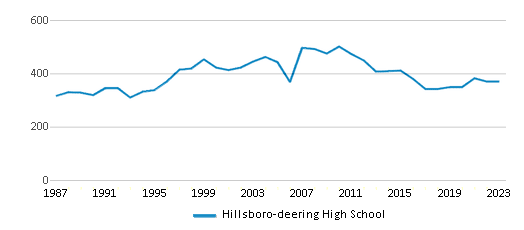
Gender %
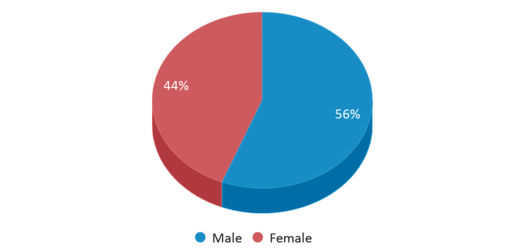
Total Classroom Teachers
34 teachers
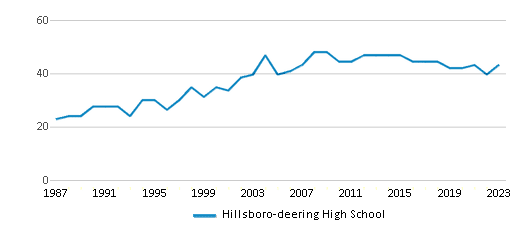
Students by Grade
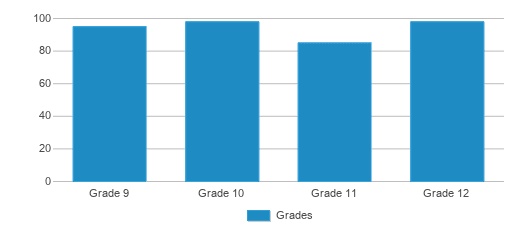
School Rankings
Hillsboro-deering High School ranks within the bottom 50% of all 457 schools in New Hampshire (based off of combined math and reading proficiency testing data).
The diversity score of Hillsboro-deering High School is 0.17, which is less than the diversity score at state average of 0.32. The school's diversity has stayed relatively flat over five school years.
Overall Testing Rank
#245 out of 457 schools
(Bottom 50%)
(Bottom 50%)
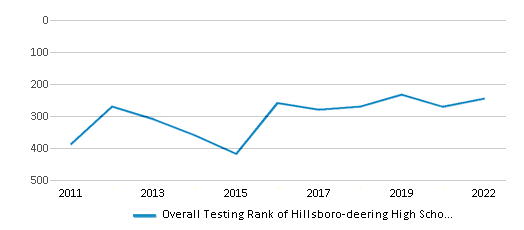
Math Test Scores (% Proficient)
30-39%
40%
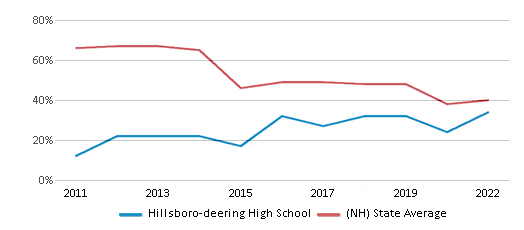
Reading/Language Arts Test Scores (% Proficient)
50-59%
51%
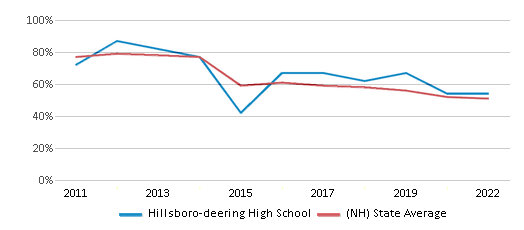
Science Test Scores (% Proficient)
30-39%
36%
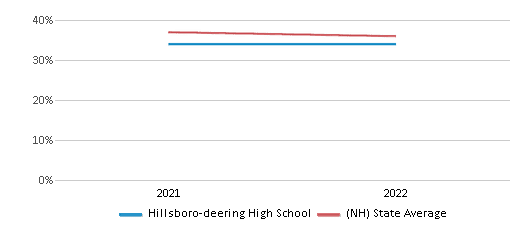
Student : Teacher Ratio
11:1
11:1
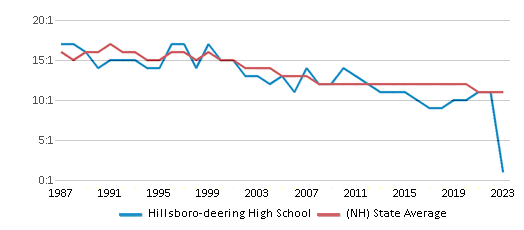
American Indian
n/a
n/a
Asian
n/a
3%
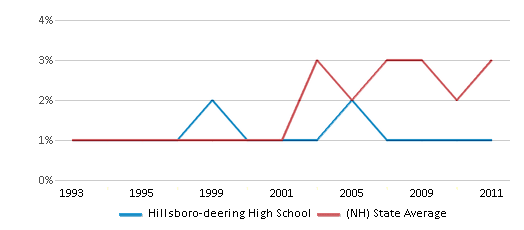
Hispanic
3%
8%
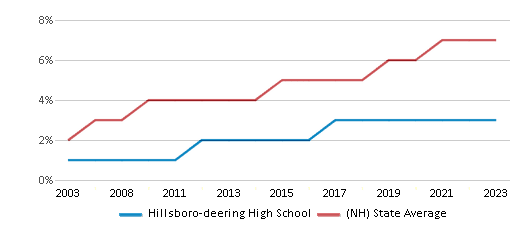
Black
1%
2%
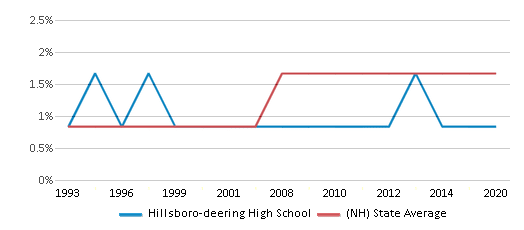
White
91%
82%
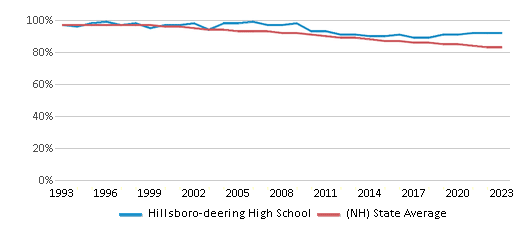
Hawaiian
n/a
n/a
Two or more races
5%
5%
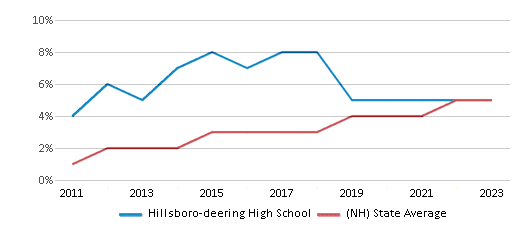
All Ethnic Groups
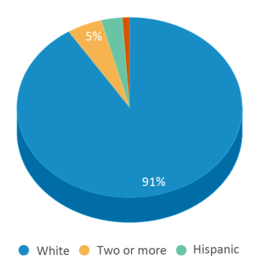
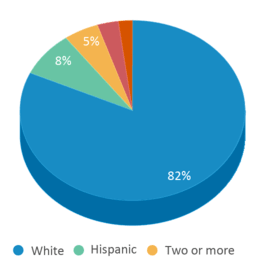
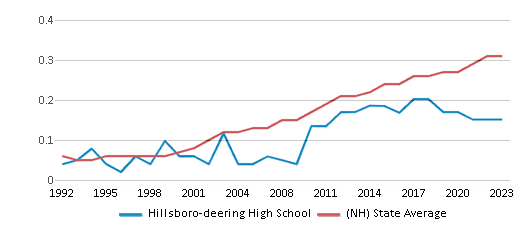
Graduation Rate
75-79%
88%
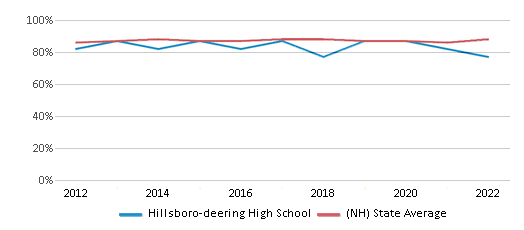
Participates in the National School Lunch Program (NSLP)
Yes
Eligible for Free Lunch
27%
20%
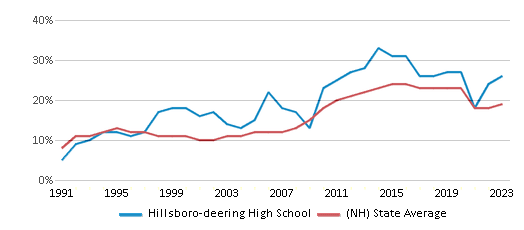
Eligible for Reduced Lunch
9%
4%
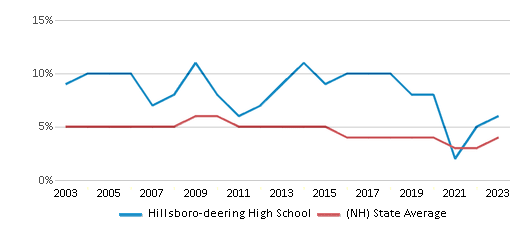
School District Name
Source: National Center for Education Statistics (NCES), NH Dept. of Education
Profile last updated: 02/09/2025
Frequently Asked Questions
What is Hillsboro-deering High School's ranking?
Hillsboro-deering High School is ranked #245 out of 457 schools, which ranks it among the bottom 50% of public schools in New Hampshire.
What schools are Hillsboro-deering High School often compared to?
Hillsboro-deering High Schoolis often viewed alongside schools like John Stark Regional High School by visitors of our site.
What percent of students have achieved state testing proficiency in math and reading?
30-39% of students have achieved math proficiency (compared to the 40% NH state average), while 50-59% of students have achieved reading proficiency (compared to the 51% NH state average).
What is the graduation rate of Hillsboro-deering High School?
The graduation rate of Hillsboro-deering High School is 75-79%, which is lower than the New Hampshire state average of 88%.
How many students attend Hillsboro-deering High School?
376 students attend Hillsboro-deering High School.
What is the racial composition of the student body?
91% of Hillsboro-deering High School students are White, 5% of students are Two or more races, 3% of students are Hispanic, and 1% of students are Black.
What is the student:teacher ratio of Hillsboro-deering High School?
Hillsboro-deering High School has a student ration of 11:1, which is equal to the New Hampshire state average of 11:1.
What grades does Hillsboro-deering High School offer ?
Hillsboro-deering High School offers enrollment in grades 9-12
What school district is Hillsboro-deering High School part of?
Hillsboro-deering High School is part of Hillsboro-Deering Cooperative School District.
School Reviews
4 1/11/2021
As a student of this school, I believe that the quality of education is amazing. There are so many amazing teachers who put effort into their lessons. The school also offers numerous extracurriculars including DECA, student council, and SADD. The thing I like most about HDHS is the personal connections you are able to establish with the teachers and staff. You will always be able to find a trustworthy adult to talk to. I truly am so happy I was able to attend HDHS and hope to come back and visit soon. Reading reviews of angry parents and kids will never be able to truly tell all that this school has to offer.
5 7/16/2020
I am a current student at this school and I wouldn't want to go anywhere else. The staff is absolutely amazing and care about you, especially the principal. He has turned this school around and made it absolutely amazing. I love the teachers and the rest of the staff. Our school is our little community and we all come together when it's needed. Our school environment is both fun and friendly, and I would definitely recommend this school.
2 9/18/2014
This school is an absolute mess, as a past student who has dealt with the staff and peers alike this school is not worth sending your child to. The staff does not care about your children and their safety. I am friends with a few students who are bullied on a daily basis, they have received physical threats from the student and the staff does absolutely nothing about it. If i was a parent that has thoughts of sending their children to this school, i would highly rethink it. home school your children parents.
Review Hillsboro-deering High School. Reviews should be a few sentences in length. Please include any comments on:
- Quality of academic programs, teachers, and facilities
- Availability of music, art, sports and other extracurricular activities
Recent Articles

What Is A Charter School?
Explore the world of charter schools in this comprehensive guide. Learn about their history, how they operate, and the pros and cons of this educational innovation. Discover key facts about charter schools, including admission policies, demographics, and funding, as well as what to look for when considering a charter school for your child.

10 Reasons Why High School Sports Benefit Students
Discover the 10 compelling reasons why high school sports are beneficial for students. This comprehensive article explores how athletics enhance academic performance, foster personal growth, and develop crucial life skills. From improved fitness and time management to leadership development and community representation, learn why participating in high school sports can be a game-changer for students' overall success and well-being.

February 05, 2025
Understanding the U.S. Department of Education: Structure, Impact, and EvolutionWe explore how the Department of Education shapes American education, from its cabinet-level leadership to its impact on millions of students, written for general audiences seeking clarity on this vital institution.









